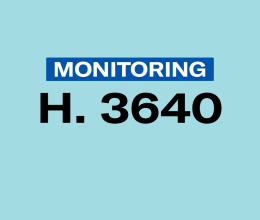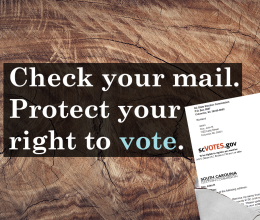
Episode 6: Whose Maps? Our Maps
There’s an old saying that South Carolina is too small for a republic but too large for an insane asylum. But what if there was a better way of thinking about our state’s problems? What if we knew our system of representative democracy was broken on purpose, and we could name the people who broke it? And what if we fought back?
On this episode, we’re diving deep on gerrymandering. Members of our legal team have an update on our landmark racial gerrymandering case that received a devastating 6-3 opinion from the Supreme Court this week. They also give us some ideas of how to keep fighting even when the system seems rigged.
If you would like to learn more and sign a petition to end gerrymandering in South Carolina, visit aclusc.org/fairmaps.
Music on today’s podcast is by Daft Hartley and A Spot on the Hill.
Transcript
SUPREME COURT AUDIO: We will hear argument this morning in case 22-807, Alexander versus the South Carolina State Conference of the NAACP.
PAUL BOWERS: Welcome to episode six of While I Breathe, a podcast production of the American Civil Liberties Union of South Carolina. I'm your host, Paul Bowers.
JACE WOODRUM: And I'm your other host, Jace Woodrum.
BOWERS: Jace, there is an old saying that South Carolina is too small for a republic but too large for an insane asylum. Have you ever heard that one? What do you make of it?
WOODRUM: I've definitely heard it. You know, it's never been a favorite. I guess I never really liked the idea of calling people crazy or something.
BOWERS: Yeah, I have the same reaction. In the base case, it's stigmatizing a mental illness. Don't love that. But I think my real problem at the base of it is that a phrase like that leads us to believe that South Carolinians are just born predisposed to self-destruction or self-sabotage. I know, having lived my whole life here, that there is nothing baked into South Carolina. I know that I'm not doing very effective political sloganeering here, but rather than say South Carolina is an insane asylum, I prefer to say that the state is broken on purpose and it's broken by the ruling class. And I know that's not as catchy, but I'd rather not let people off the hook like that.
WOODRUM: Yeah, it's not catchy. It's not going to fit on a bumper sticker.
BOWERS: We'll workshop it.
WOODRUM: Yeah. I mean, it does bring us to the subject of today's podcast episode. You know, one of the ways powerful people -- as you call them, the ruling class have broken our state is by cheating us out of a truly representative democracy. Aand they do this in very dramatic fashion every 10 years through a process called gerrymandering. The weirdest, one of the weirdest words I feel like I get to say really often.
BOWERS: Yeah, I'm still getting used to it. It does not roll off the tongue.
WOODRUM: No, it does fit on a bumper sticker though, but what it means certainly wouldn't, because gerrymandering means drawing election maps to grant political power to one group of people over another. And you know, often we hear about racial gerrymandering and that's when the legislature draws maps to consolidate white political power and lessen the power of other racial groups. But we also have an ongoing problem of partisan gerrymandering. And that is where the majority party in power seeks to preserve and expand that power, preserve and expand the control of that legislative body.
And really in my mind, gerrymandering strikes at the very heart of American civil liberties. I mean, what is more American than this idea that we elect our own representatives? But here with gerrymandering, rather than the voters choosing their politicians, politicians get to choose their voters. It makes a game out of democracy. It certainly makes cheating possible, and ultimately all but the most powerful elite end up losing in the end.
BOWERS: Yeah. For those of you who listened to our previous episode, you'll remember we talked with members of our advocacy team about how lawmakers attacked our civil liberties in 2024 and how South Carolinians showed up to defend them. On this episode, we'll be joined by Tish and Allen, two of the brilliant members of our legal team here at the ACLU of South Carolina. And we're going to talk about how our state lawmakers gerrymander their own election maps, what that means for democracy, and the way those maps affect everything from public schools to pothole repairs. So thanks for listening. Stay with us.
ALLEN CHANEY: Hey, good morning, Paul. I'm Allen Chaney. I am the legal director of the ACLU of South Carolina, and I live here in Greenville.
BOWERS: So, Allen, we have some late breaking news on a case that you've been working on, Alexander v. South Carolina NAACP. Long story short, the Supreme Court ruled on May 23rd against our clients and against the interests of South Carolina voters, black voters in particular. What has our team been arguing in that case? And what was the outcome that we hoped to achieve for voters?
CHANEY: Yeah. So following the last federal census, the South Carolina legislature had to redraw our congressional districts. Specifically, the First Congressional District now had too many people and the Sixth Congressional District had too few people. And what we were arguing was that in the process of redistricting the first and sixth congressional districts, that the legislature selectively removed Black voters in Charleston County and exiled them into CD-6, a district that's anchored a hundred miles away in Columbia. To do that, we put on evidence showing that the movement of voters into and out of CD-1 was predicted by the race of the voter being moved and not by the political affiliation of the voter. We put on that evidence over the course of a two-week trial in federal court.
Three federal judges unanimously agreed that we had shown that the legislature excised black voters, had essentially bleached Charleston County and ruled that the first congressional district was an unlawful racial gerrymander.
BOWERS: You know, the layman's understanding of gerrymandering that I know you always correct me on is just funny-shaped maps. You know, if there's a weird shape on the map, that always looks fishy. That's not always the case. Sometimes it's drawn that way for a reason. I live in North Charleston. I happen to be in a section that has been part of the sixth congressional district and was unchanged by this. But yeah, when I looked at the changes, when I looked at the neighborhoods that were cut out of district one, it really couldn't be clearer. This was a gerrymander and it was a racial gerrymander.
CHANEY: Yeah. If you look at the voting precincts that were moved out of the first congressional district in Charleston, you'll see that 9 of the 11 precincts with the highest percentage of Black voters were moved out of the district. While a number of other districts that were heavily Democratic, but were white were left in CD-1. And we had very, very smart mathematicians and political scientists come in as experts and attempt to disentangle the movement of voters on racial versus political lines. And they conclusively determined that race was a better predictor of who was getting moved out.
The state put on no contrary expert evidence. They really didn't rip up that evidence at all. And ultimately just relied on the Supreme Court to bail them out, which turned out to be just a fine strategy for them.
BOWERS: We have a 6 -3 split opinion from the Supreme Court now. Again, this is pretty new as we're recording. This happened May 23rd. What did the majority opinion say? And what does that mean for South Carolina voters?
CHANEY: Six members of the court inverted their own precedent, which requires appellate courts to give deference to trial courts when it comes to fact finding. The Supreme Court's majority here really didn't spend a lot of time talking about the law and instead selectively re-examined the facts and gerrymandered them to get to the outcome that they wanted to get to, which was reversal.
BOWERS: So it's reversed and, you know, if you're just a South Carolinian who's going to be voting in a primary soon and then in a general election in the fall, where do things stand? Are the maps going to stay as they are?
CHANEY: The maps are going to stay as they are for this election cycle. When we filed the case, we had two claims. One was a racial gerrymandering claim. The other was an accusation that the state intentionally diluted the voting power of Black voters. The Supreme Court disagreed with the trial court's analysis on that. So our two claims are analytically distinct. They succeed or fail in accordance with a different test entirely. And the U.S. Supreme Court actually remanded our intentional vote dilution claim back to the trial court to apply the correct standard to that claim. And so we're still evaluating what that means as a legal team. It creates an outside possibility that we still get relief sometime.
But certainly the 2024 election will be like the 2022 election on the enacted plan, which everyone agrees is an unfair plan that is built at minimum to prejudice in favor of Republican voters and against Democratic voters in the first congressional district.
BOWERS: That was something that was really galling to me, even just listening to the oral arguments before the Supreme Court. The defense that our state lawmakers and map makers offered was, "No, no, no, we're not racially gerrymandering. We're rigging this for partisan reasons." I'm not putting words in their mouth. That was their defense. Like, no, no, no, we did this so that Republicans could maintain control. As someone who's not an expert on these constitutional matters, that just seems so straightforwardly like an admission of cheating. They're cheating, you know?
CHANEY: Yeah, it really was quite audacious. They were saying the quiet part out loud. And currently there's not a mechanism, at least in federal court, to make that claim. The Supreme Court in Rucho ruled that a partisan gerrymandering claim is not an allegation that the federal courts can touch. And so when members of the legislature came to trial in our case, they really leaned into that.
So you have Shane Massey, Senator Shane Massey, saying that partisanship was the primary factor in the reconfiguration of the first congressional district.
BOWERS: Yeah, that's incredible.
CHANEY: Senator Chip Campsen said that the Republicans would never have passed a plan that did not cement their advantage in CD-1. They were very transparent that they were reacting to close elections in 2018 and 2020, where in 2018, the district flipped to Democrats when Joe Cunningham was elected and then narrowly was retaken by Republicans when Nancy Mace beat Joe Cunningham in 2020. And they didn't want a close election again. They wanted to make sure that whatever plan they passed cemented an artificial advantage for Republicans in Congress.
BOWERS: Well, I had a hard time reading that majority opinion yesterday, but after a while I skipped down to the bottom of the opinion where you get to read the dissent. So in this case, Justice Kagan wrote the dissenting opinion and was joined by Justices Sotomayor and Jackson. And that was some pretty good reading, if nothing else.
This line stood out to me. I wondered if you'd like to respond to it. So, dissenting opinion, Justice Kagan writes "When racial classifications in voting are at issue, the majority says, every doubt must be resolved in favor of the state, lest (heaven forfend) it be accused of offensive and demeaning conduct ... What a message to send to state legislators and mapmakers about racial gerrymandering."
CHANEY: Yeah, there's a lot there. And I think we can collectively applaud Justice Kagan's writing and her mind. She is often in the dissent in these important cases. We now have a 6 -3 ideological divide on the court that seems to dictate the outcome in many of the most politically charged cases, ours certainly being one of those.
But essentially, I think one of the things that she's saying is that the court, I think like white people generally, are a bit too triggered by any discussion of race. There's just a collective flinch when race is mentioned, in that it's almost untoward for us as plaintiffs to have the audacity to come in and accuse the legislature of sorting people on the basis of the race, you know, on the basis of race and the collective discomfort that the majority feels really shows up in their evaluation of the facts here, in the absence of the state putting on any of their own expert evidence, in the absence of the state convincing the trial court that our expert evidence shouldn't be relied on. The majority just does it for itself because it would rather do mental gymnastics than engage with the possibility that lawmakers in the South are still classifying voters based on the color of their skin.
BOWERS: Well, Allen, I'm sure you are already tired of people asking you this, but what happens next? As you mentioned earlier, part of this case is still live, getting sent back to a lower court. Are you able to share anything about what happens with this case and about our plan from here forward?
CHANEY: I'm not in a position right now to comment on what happens next in this case, except to say that a mandate will issue from the Supreme Court returning jurisdiction to the trial court on the intentional vote dilution claim. And then we're still trying to figure out what happens next after that happens. Aside from that, though, I think it's important to acknowledge that this is a battle and not the war. This is a loss that certainly stings, but it's not the only path to improving democracy in South Carolina. There remain legal and policy solutions to the unfair maps that persist at the state and local level in the state.
BOWERS: Yeah, that's a good word. I think a lot of us felt really discouraged this week, and it can feel like we're facing an inevitability when we're looking at the decisions of a Supreme Court that is beyond public control, beyond any sort of pressure we might exert. But there are other ways to keep up the fight. And I guess that's as good a segue as any to the next portion of our show. After this quick break, we're going to bring on our colleague and another member of the legal department, Tish, really excited to introduce her and talk some more about the problems of racial and partisan gerrymandering and where we go from here.
CHANEY: Yeah, I want to comment as well. I'm frustrated too. I understand why people would be frustrated and disappointed by this case. I am too. I went to law school and was taught that being right matters. I was taught that if you make the right arguments under the right standard and bring convincing evidence, that you should win. And unfortunately, that doesn't feel like the reality at the United States Supreme Court right now. It feels like on these flashpoint cases, there is a decision at the outset that the case will turn out a particular way. And then the reverse engineering of rationales to support that decision. And that's what this felt like here. So it's not just that we lost, it's that it feels like the law didn't win.
BOWERS: Tish, starting with you, you are our newest hire. I'm really excited you're here, coming back to South Carolina. Tell us a little bit about yourself.
TISH GOTELL FAULKS: Thank you, Paul. Good morning. My name is Tish Gotell Faulks. I am the affiliate's voting rights staff attorney. As you mentioned, I am returning to South Carolina. I attended both high school and college in South Carolina. I've been all over the East Coast and the South practicing and learning about the law. And I am now coming back to South Carolina to elevate the discussion on voting rights and partisan gerrymandering and the need to correct those issues.
BOWERS: What are some ways that you see voting rights affecting our other constitutional rights?
FAULKS: Well, Paul, voting is foundational to protecting all of our constitutional rights and freedoms, protecting your First Amendment rights and interests, the right to assemble, to protest, the right to express yourself, your free exercise of your religious beliefs or lack of religious beliefs. All of those require that we hold the government back from interfering in individual lives. And when the voting system is not working effectively, you basically find the government overreaching, prohibiting speech, denying privacy rights and interests, failing to protect your liberties and interests long term. And here in South Carolina, we see that play out. When it comes to your privacy interests, the government in South Carolina has started trying to interfere in your medical decisions and the important decisions of your family, whether that's compelling pregnancy, when we know that that is a deeply personal decision that needs the guidance of medical professionals, not politicians. When it comes to what medical care you seek for yourself, your children, and your own well-being, the state of South Carolina is interfering. It is placing itself in your doctor's office and taking off the table critical medical decision making.
And so when your legislature, the government, is trying to lean in and control your life in an unexpected way, the ACLU and people who protect your constitutional rights need your help and attention. The legislature isn't responding to the preference of the people. And if we don't fix voting rights, it doesn't matter what we, the people, prefer. The legislature will do what they please.
BOWERS: That point about the government coming into our privacy, coming into rooms where we don't expect them to be, that was something that came up on, actually, episode four. I was talking with a woman who had a really difficult pregnancy and ended up having to seek an abortion. And she talked about being in a room with her doctor, other specialists, all these medical experts who were there to give her care, to help her. But it was like there was someone else in the room because this was after the abortion ban passed.
Well, Allen, I feel like I'm winding you up for a rant I've heard from you several times already. But for the benefit of the public, I was wondering if you could just share what we know about the relationship between gerrymandering, primary elections, and political extremism in our state.
CHANEY: Thanks, Paul. And I will try not to be the guy at the bulletin board with strings going everywhere and Sharpie. But there is some table setting necessary to answer that question. So. Every 10 years, we have a federal census. So we count the number of people that live in the country and where they live. And after that process, we redraw our legislative districts to ensure that each district has roughly the same number of people in it. And that ensures that each district has the same relative amount of sway over politics. Now, how those lines get drawn has a great deal of influence over outcomes. So when a district is drawn so as to create an inevitable result that benefits one party over another, that has a whole bunch of negative consequences.
So in South Carolina, our state legislature is responsible for drawing 177 legislative districts. They draw 124 House seats, they draw 46 Senate seats, and they draw 7 congressional districts. Of those 177 districts, only 4 are competitive. And what that means is that in all but four legislative districts, the result of a general election is intended to be inevitable, which means that who ultimately represents a district is decided to a much greater degree at a primary election rather than a general election.
What does that mean practically? It means that, one, far fewer voters are actually creating the outcome. It also means that the most extreme voters are creating the outcome because what we know from various studies, exit polling, et cetera, is that primary voters tend to be, they're far more extreme voters relative to the median of even their party. So that creates a situation where the state house is a far more polarized, far more extreme place to do business than your neighborhood street. You see a extreme disconnect between the policy preferences of ordinary South Carolinians and the rhetoric and behaviors of lawmakers that are supposed to be doing the wishes of the voters.
BOWERS: One thing that I found is I was reading about the history of gerrymandering and redistricting lawsuits in our state is, one, people have had to sue over and over again to challenge unfairly drawn maps for our elections. It's happened just about every decade going back to I think the sixties. There's always somebody trying to game the system and then somebody who has to come in and challenge that. But historically speaking, I was interested to learn that gerrymandering has cut both ways along partisan lines. One historical note here is in 1984, it was actually the South Carolina Republican Party that joined in with the South Carolina NAACP to sue and challenge unfair district lines in South Carolina. So because this has cut both ways historically, how would you explain just to the average voter at the ballot box, what is the effect of all this gerrymandering along partisan and racial lines?
FAULKS: Well, first and foremost, we know that partisan gerrymandering devalues the needs of people across the state. When you have gerrymandered your maps, the representatives who are elected under those maps are not going to be held accountable by their voters. They have a quote unquote higher mission to deal with public policy concerns that may not directly impact and improve South Carolinians' lives. We also know that that means that the smaller issues, the local issues, potholes, infrastructure development, business development, are not being taken care of by your legislature because they are managing hyper-partisan national issues that may not have anything to do with the lived experience of South Carolinians on the ground.
BOWERS: Yeah, that's something I think of as a parent with kids in school, is that our legislature talks a lot about schools, but it's usually about punishing teachers for saying the wrong thing or banning a book when, you know, we have real problems we could be solving. Our classroom sizes keep growing. We keep losing great teachers who quit because the pay and working conditions are intolerable. We have, especially in rural areas, physical school buildings that are crumbling. And if we had a more responsive legislature, we could solve all these problems. But instead we spend a lot of time creating new ones.
So during election season, I've spoken with people involved in voting rights work or in get-out-the-vote work. And often they're encouraging people to go out and vote in the primary, the argument being even if it's not your preferred party's primary, that's where your vote actually counts. If you want to vote and you want it to matter, go out and vote in the primary. What do you make of that? Is that, is that accurate? Is that valid advice to give people?
FAULKS: Well, first and foremost in the state of South Carolina, we have open primaries. That means that you do not have to be registered for either party or any party to vote in that party's primary. Second, knowing that the outcome of an election is probably determined during the primary, the first best way to have your voice heard, even if you are not a member of the party having the primary, is to go out and vote in that primary. Select the best of the choices offered in the primary rather than rejecting the primary outright and then having the representative that was chosen by those who opted to come out and vote. It is a gift that in South Carolina, you do not have to register beforehand to vote in a primary and have your voice heard. And voting is not about voting for the best candidate of your party. It's about voting for the best candidate.
CHANEY: Yeah, I agree with Tish on this. I think the more voters we have showing up to primaries, the more moderating influence we will have on behavior and candidate selection. One of the most negative consequences of partisan gerrymandering is that it breaks down the accountability that's supposed to exist between elected officials and their constituents.
So if we look at Thomas Beach, for example, one of the most extreme members of our South Carolina House of Representatives, He won a contested primary in 2022 with 1,600 votes. He represents a district of 42,000 people. He essentially only has to keep 4% of his district happy to keep his job. If we double, triple, quadruple the number of people showing up to those primaries, we suppress the influence of the extremely, the extreme members of a particular party. We create a sort of de facto general election and we increase accountability between lawmakers and their constituents.
FAULKS: Paul, I just want to add that for people who actually pay attention to the political theater, you can see this play out as people talk about extreme rhetoric during the primaries and moderating that rhetoric for the general election. You have these firebrands who are out there just saying outrageous things to attract voters to their cause. And then in the general, they get a little bit less feisty. They get a little bit more buttoned up and congenial. And we have to keep in mind that the way that we manage while we are in a hyper-gerrymandered environment is to pressure those in gerrymandered areas to moderate their rhetoric and their behavior out of concern for being held legislatively and politically accountable.
BOWERS: This is all sound advice. I mean, this is what we have to do given the system as it's currently structured. But sometimes when I think too long and I linger too long on the state of gerrymandering here, it makes me feel pretty cynical about voting. It makes me despair a little bit about the way our democracy is broken. What can we do meaningfully to fight back against gerrymandering? As South Carolinians and also as an organization here at the ACLU of South Carolina, what are our options?
CHANEY: Although it does risk that despair that you mentioned, I think it's really important to understand the consequences here. Unlike other sorts of bad policy, this partisan gerrymandering issue undermines the very democratic machinery that we rely on to effectuate our representational form of government. And I understand why that could lead to a form of fatalism, but because the consequences are so high, this is the moment to lean in, not to withdraw.
And so what does that look like? I think there are members of our General Assembly that still care what their constituents are telling them. Recent polling from Winthrop University suggests that most people don't know about gerrymandering or its effects on democracy. And so I think there is a huge opportunity here for voters to first understand and then respond to the crisis that we're in when it comes to democracy in South Carolina.
And so the first thing I would encourage folks to do is to tell their friends about what's going on and then tell their legislators what they want to happen. Legislators need to hear from their constituents about how they want redistricting to occur and the sorts of rules they want to govern the process. There are a number of states that have simple statutory language that puts guardrails on the redistricting process. Florida, for example, has a law on the books that guards against the most extreme versions of partisan gerrymandering.
BOWERS: This is a rare instance where I wish we could be more like Florida.
CHANEY: A very rare instance.
FAULKS: Paul, I also think it's important to always keep in mind that more participation matters. 50% of those eligible to vote across the country opt not to turn out. If we improved turnout by as little as 10%, that would heavily impact election outcomes. And while gerrymandering is designed to create this despair, this why-bother attitude, it is critical to keep on the pressure by turning out, voting, having your voice heard, and demanding that elected officials answer questions about policy in your region. I hope that in South Carolina, over the course of the next several years, we have a revolution of voter turnout to demonstrate that the people of South Carolina are watching and they demand better governing.
BOWERS: One thing that my parents taught me early on was to pay close attention to local politics and local news because, you know, we get very excited about a presidential election every four years, and that matters, but the people who affect your day to day life are your town council and school board members and your state lawmakers. So if you don't know who your state house representative and senator are, it's okay. If you go to scstatehouse.gov, there's a tool there to just enter your address and look up who represents you. I think that's an important first step. Not every lawmaker is going to listen to you, but the one who has to win your vote often does care, or at least they should care. So that's a start. You know, keep your eyes on the state house because that's where a lot of our rights are either preserved or thrown out in this state.
CHANEY: If I could just add to the voter turnout comments that Tish put really well, I just want to make sure we talk about how nonpartisan of an issue partisan gerrymandering actually is. So much so that I think it's probably more accurate to say that it is an anti-partisan issue. In that all voters are against partisan gerrymandering. That's what polling suggests, that's what anecdotal evidence provides. Also, all lawmakers from both parties are perfectly willing to cheat when it behooves them. So partisan gerrymandering is something that entrenches liberal influence in New York and entrenches conservative influence in South Carolina. And in both instances, it's the voters who lose. It's the voters who lose an opportunity to hold their elected officials accountable. It's the voters who lose an opportunity to have their issues centered at the legislature. And we see that in South Carolina. We see session day after session day dedicated to these national culture war issues that are far from the priorities of average South Carolinians while we hear issues like the state of our education system, the state of our roads and bridges, our state pension and retirement plans get very, very little lip service, if at all.
I think that there is certainly a perception of the ACLU that it has become an increasingly partisan institution. And while it is true that we have issue priorities that more frequently align with the progressive side of our current political spectrum, that's not what we're talking about here. Success when it comes to fixing partisan gerrymandering would look like laws that reflect the will of the people. And we will continue to press our issues within those spaces, but our priority when it comes to attacking partisan gerrymandering is to actually have a representative form of government where the laws that are passed reflect the will of the voters and not the caprices of the legislators.
WOODRUM: Thanks for joining us for another episode of While I Breathe, a podcast production of the ACLU of South Carolina. Now, if you're fired up about what you just heard, we recently launched a petition to end gerrymandering in South Carolina. You can add your name at aclusc.org/fairmaps. And we'll be in touch with specific ways you can show up for democracy in our state. Again, it's aclusc.org/fairmaps.
BOWERS: Thank you for listening. I know we get into the weeds and we aren't always little rays of sunshine on this podcast. But if there's a message I want to leave you with, it's that things don't have to stay this way. Another world is possible if we're willing to fight for it. If you enjoyed today's episode, be sure to leave us a review on whichever platform you use and tell all your friends to check us out. Even in the internet age, we still depend on word of mouth.
Music on this episode is by Daft Hartley and A Spot on the Hill.
WOODRUM: Until next time, while I breathe, I hope.
Related content

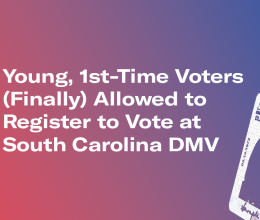
Young, First-Time Voters (Finally) Allowed to Register to Vote at...
April 7, 2025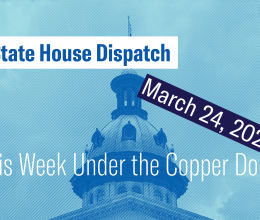
State House Dispatch: March 24, 2025
March 24, 2025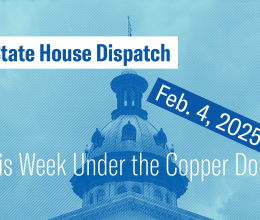
State House Dispatch: Feb. 4, 2025
February 4, 2025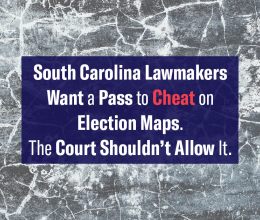
S.C. lawmakers want a pass to cheat on election maps. The court...
January 30, 2025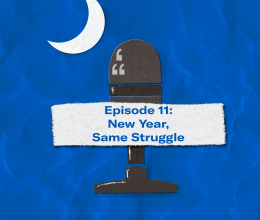
Episode 11: New Year, Same Struggle
December 23, 2024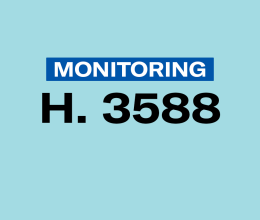
Write-In Candidates for Municipal Office (H. 3588)
December 12, 2024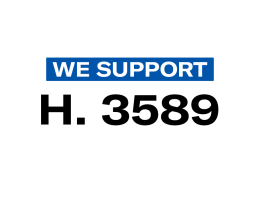
Ranked Choice Voting (H. 3589)
December 12, 2024